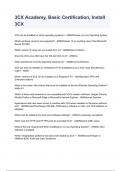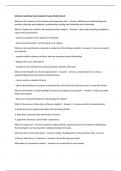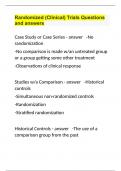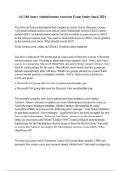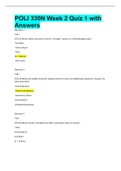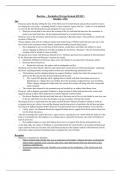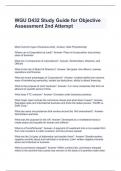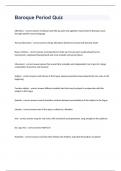Chapter 1: Scope and nature of the handbook
Field problem: situation in reality which in the view of some influential stakeholders can or
should be improved.
FPS: Field problem solving, changing the ‘actual’ into the preferred, instead of explanatory
research. – engineer approach rather than scientist. First objective to improve the
performance of the business system under consideration but gained knowledge can be
transferred to other settings like comparable cases.
Focus of handbook
Focus is on the design of the solution for the business problem, on the design of the change
process needed to realize that solution and on the analyses needed to make those designs.
It is about business improvement on the basis of designed sound solutions (as opposed to a
‘muddling through’ approach). This is why we use the term ‘design-oriented’.
Theory-informed: should be interpreted as the comprehensive, critical and creative use of
theory and not as simply copying theory to every different case.
Chapter 2: Student projects
Two main research paradigms to be used in student fieldwork in business and management:
Explanatory paradigm: the research paradigm of mainstream research in most social
sciences. It aims to produce descriptive and explanatory knowledge. Such a project may
follow the empirical cycle.
Design science paradigm: the research paradigm of professional schools, such as medical
schools, engineering schools and, increasingly, business schools. It aims to produce
solutions to field problems. Such a project may follow the problem solving cycle.
Two basic sets of process steps:
The empirical cycle
Observation
The start of the empirical cycle. One focuses on a type of
business phenomenon in the real world and the related
academic literature. The observation could be that the
problem is common but literature is lacking.
Induction
Possible explanations for the problem, aided by existing
related literature. This is a theory-developing step.
Deduction
The most promising ideas of the induction step are transformed into hypotheses.
Testing
Typically done through the application of statistical techniques, sometimes by case studies.
Evaluation
The outcomes of the empirical test are examined and interpreted, this may result in new
research questions and a rerun of the empirical cycle. -> Is the new content created right?
,Problem solving cycle
Problem definition
To formulate a clear business problem, the
interrelated problems a business has called the
problem mess has to be identified and structured.
Analysis and diagnosis
Problem and context are analyzed and the causes of
the problem are established as far as possible. The
most important causes most be identified and validated.
Solution design
The most important causes must be tackled and the implementation of the solution has to be
designed.
Intervention
the solution to the business problem is implemented at the company on the basis of the
actions conceived in the design step.
Evaluation
The effects of the implemented solution are assessed. This evaluation may lead to the
definition of a new business problem and a restart of the problem solving cycle. -> does the
solution work?
When to use the different cycles: (slides)
Could be used together when needed to for example provide analysis and diagnosis
to a business problem.
Empiric cycle
• Used to generate improved or additional descriptive or
explanatory theory (book).
• Theory development and empirical testing.
• Relationships between variables.
• Used for generic business issues that many businesses encounter.
• Aims to find generalizable insights that can be of value across contexts.
Relevance-driven: Explaining, Theorizing, Predicting, Generalizing
Problem-solving cycle
• Used for performance-related business issues.
• A business process that does not meet a defined performance level, such as cost, quality
and timeliness.
• Dissatisfied stakeholders.
• Context-specific.
, Three knowledge-generating research
processes
Processes to develop descriptive or explanatory generic theory which can be objectives in
one’s graduation project:
Theory development
It follows the firsts steps of the empirical cycle and the outcome of the theory development
process is a set of propositions, comparable to the end of the induction step, or beginning of
deduction step.
The trigger (first step) for this type of research is a business phenomenon that is generally
recognized in companies. Thus it is more general than a specific business problem of one
company. Furthermore, the theory development is needed when the business phenomenon
has not yet been addressed in academic literature or when the literature is still very
exploratory. The literature covered on this topic will therefore be very diverse and this will be
a very helpful starting point for a theory development process.
The next step is to observe the phenomenon in practice. The first step has specified the
problem in detail and therefor the observation will be straightforward, e.g. one or more case
studies, decisions analyzed, interviews conducted, practices observed. A cross-case
analysis compares the results of the cases.
Next, The results are compared to existing ideas in academic literature, especially not yet
obtained literature to complete set of propositions.
Theory testing process
Also empirical cycle based process like theory development. However this time, the process
focuses on the second part of the empirical cycle; the deduction, testing and evaluation
steps. The outcome of this process is a newly tested (part of a) theory.
Again, the trigger of this process is a business phenomenon that has not been fully
addressed in academic literature. However, the streams related to business phenomena
have been elaborated to a further extent than with the Theory Development Process and is
less diverse. Nevertheless, there remains a gap to be closed in the literature.
Secondly, the relevant variables need to be identified through literature and any proposed
mutual relationships are put down in a conceptual model. For each proposed relationship
without mention in the literature a hypothesis is made.
Field problem: situation in reality which in the view of some influential stakeholders can or
should be improved.
FPS: Field problem solving, changing the ‘actual’ into the preferred, instead of explanatory
research. – engineer approach rather than scientist. First objective to improve the
performance of the business system under consideration but gained knowledge can be
transferred to other settings like comparable cases.
Focus of handbook
Focus is on the design of the solution for the business problem, on the design of the change
process needed to realize that solution and on the analyses needed to make those designs.
It is about business improvement on the basis of designed sound solutions (as opposed to a
‘muddling through’ approach). This is why we use the term ‘design-oriented’.
Theory-informed: should be interpreted as the comprehensive, critical and creative use of
theory and not as simply copying theory to every different case.
Chapter 2: Student projects
Two main research paradigms to be used in student fieldwork in business and management:
Explanatory paradigm: the research paradigm of mainstream research in most social
sciences. It aims to produce descriptive and explanatory knowledge. Such a project may
follow the empirical cycle.
Design science paradigm: the research paradigm of professional schools, such as medical
schools, engineering schools and, increasingly, business schools. It aims to produce
solutions to field problems. Such a project may follow the problem solving cycle.
Two basic sets of process steps:
The empirical cycle
Observation
The start of the empirical cycle. One focuses on a type of
business phenomenon in the real world and the related
academic literature. The observation could be that the
problem is common but literature is lacking.
Induction
Possible explanations for the problem, aided by existing
related literature. This is a theory-developing step.
Deduction
The most promising ideas of the induction step are transformed into hypotheses.
Testing
Typically done through the application of statistical techniques, sometimes by case studies.
Evaluation
The outcomes of the empirical test are examined and interpreted, this may result in new
research questions and a rerun of the empirical cycle. -> Is the new content created right?
,Problem solving cycle
Problem definition
To formulate a clear business problem, the
interrelated problems a business has called the
problem mess has to be identified and structured.
Analysis and diagnosis
Problem and context are analyzed and the causes of
the problem are established as far as possible. The
most important causes most be identified and validated.
Solution design
The most important causes must be tackled and the implementation of the solution has to be
designed.
Intervention
the solution to the business problem is implemented at the company on the basis of the
actions conceived in the design step.
Evaluation
The effects of the implemented solution are assessed. This evaluation may lead to the
definition of a new business problem and a restart of the problem solving cycle. -> does the
solution work?
When to use the different cycles: (slides)
Could be used together when needed to for example provide analysis and diagnosis
to a business problem.
Empiric cycle
• Used to generate improved or additional descriptive or
explanatory theory (book).
• Theory development and empirical testing.
• Relationships between variables.
• Used for generic business issues that many businesses encounter.
• Aims to find generalizable insights that can be of value across contexts.
Relevance-driven: Explaining, Theorizing, Predicting, Generalizing
Problem-solving cycle
• Used for performance-related business issues.
• A business process that does not meet a defined performance level, such as cost, quality
and timeliness.
• Dissatisfied stakeholders.
• Context-specific.
, Three knowledge-generating research
processes
Processes to develop descriptive or explanatory generic theory which can be objectives in
one’s graduation project:
Theory development
It follows the firsts steps of the empirical cycle and the outcome of the theory development
process is a set of propositions, comparable to the end of the induction step, or beginning of
deduction step.
The trigger (first step) for this type of research is a business phenomenon that is generally
recognized in companies. Thus it is more general than a specific business problem of one
company. Furthermore, the theory development is needed when the business phenomenon
has not yet been addressed in academic literature or when the literature is still very
exploratory. The literature covered on this topic will therefore be very diverse and this will be
a very helpful starting point for a theory development process.
The next step is to observe the phenomenon in practice. The first step has specified the
problem in detail and therefor the observation will be straightforward, e.g. one or more case
studies, decisions analyzed, interviews conducted, practices observed. A cross-case
analysis compares the results of the cases.
Next, The results are compared to existing ideas in academic literature, especially not yet
obtained literature to complete set of propositions.
Theory testing process
Also empirical cycle based process like theory development. However this time, the process
focuses on the second part of the empirical cycle; the deduction, testing and evaluation
steps. The outcome of this process is a newly tested (part of a) theory.
Again, the trigger of this process is a business phenomenon that has not been fully
addressed in academic literature. However, the streams related to business phenomena
have been elaborated to a further extent than with the Theory Development Process and is
less diverse. Nevertheless, there remains a gap to be closed in the literature.
Secondly, the relevant variables need to be identified through literature and any proposed
mutual relationships are put down in a conceptual model. For each proposed relationship
without mention in the literature a hypothesis is made.



